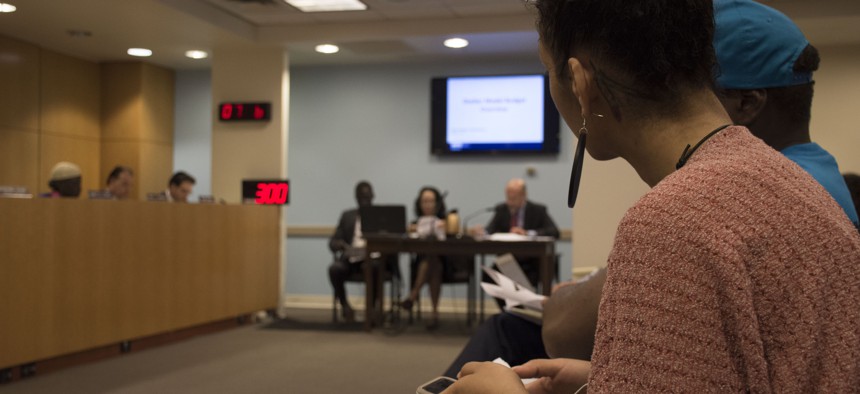Human services nonprofits show how city drives them into the red
City agencies and human services organizations discussed efforts to improve contracts at June 21 City Council hearing.

A June 21 New York City Council hearing discussed efforts to improve contracts for human services nonprofits that deliver social services on behalf of the city. Zach Williams
New York City nonprofits continued efforts on June 21 to secure better contracts with city agencies that would result in higher pay, better benefits and faster payments for the social services that nonprofits deliver to millions of people each year.
Sector representatives who testified that day before a joint meeting of the City Council committees on general welfare and contracts said they remain in financial distress as efforts continue to implement “model budget” processes at city agencies, with mixed success. Some city agencies need to move quicker to make good on commitments to streamline the procurements process, quicken payments and better fund human services nonprofits. Otherwise, vital services could suffer.
“Ultimately this is about our ability to serve communities well. The infrastructure of the nonprofits matter,” said Allison Sesso, executive director of the Human Services Council. "It’s not that sexy. I get it. ‘indirect rates?’ Who cares? – but it does matter to how we deliver services and that is what we need to fix."
Nonprofit representatives appreciate ongoing city efforts to create more equitable contract terms. These have included receiving $300 million of a $500 million request for new funding to support efforts to pay human services staff more, boost benefits and create model budget processes this year among preventative services, senior centers, and services for runaway homeless youth, and adult protective services.
But despite some progress in the last year, nonprofits like The Fortune Society, a 300-person organization that serves the recently-incarcerated, teeter in a precarious position at a time when Mayor Bill de Blasio has pushed an agenda to create the “fairest city” in the country.
“We have experienced some of the worst delays in payments on major city government contracts we’ve ever seen,” said Rob DeLeon, associate vice president of programs at The Fortune Society. “We came dangerously close to reaching our maximum limit on our line of credit with the bank. If that happened, we would not be able to cover payroll for our staff.”
Other nonprofits echoed that experience during the hearing, held at the council’s office at 250 Broadway. Representatives from the Chinese-American Planning Council, LiveOn NY, United Neighborhood Houses, Homeless Services United, Catholic Charities of Brooklyn and Queens, and Nonprofit Finance Fund said that financial relief cannot come fast enough for human services nonprofits.
Nearly all human services providers reported that underfunded and late contracts are the norm – 75 percent report their contracts pay late, compared to a 56 percent rate nationwide, according to the State of the Nonprofit Sector Survey released in May by the Nonprofit Finance Fund.
While human services advocates fell short in budget negotiations this year for the additional $200 million in funding, they did succeed in securing $300 million in Fiscal Year 2018, yet city agencies have had mixed results in getting model budgets done.
The Administration for Children’s Services is implementing its model budget process among approximately 50 nonprofit contractors as the new fiscal year begins on July 1, according to Commissioner David Hansell. But that process will take longer for other city agencies, including the Department of Homeless Services and the Department for the Aging.
The latter department did not solicit feedback from nonprofits when designing its model budget process, resulting in months of delays that left nonprofits in the dark, according to the Federation of Protestant Welfare Agencies.
“This is in sharp contrast with the model budget process at the Administration for Children’s Services," Emily Miles, chief program and policy officer at FPWA, said at the hearing. “ACS engaged providers extensively, conducting about ten focus groups to hear first hand from front line staff."
A backlog of contracts that are still making their way through the city procurements process has had to take priority over implementing the model budget process, according to Steven Banks, commissioner of the Department of Social Services/Human Resources Administration. Nowhere has this been more urgent than in homeless services. A recent report from city Comptroller Scott Stringer stated the department was late in approving contracts 100 percent of the time.
Homeless services has caught up on more than 1,000 contracts, but this has delayed the implementation of the model budget process, Banks said on June 21.
“Our hope was that we might come to a conclusion by the end of this fiscal year,” he said.
The new target is to implement model budgets in the fiscal year that begins on July 1, according to Banks, who declined to give any specific timeline in response to a question from Councilman Stephen Levin, chair of the Committee on General Welfare.
“I don’t want to set an artificial deadline,” Banks said.